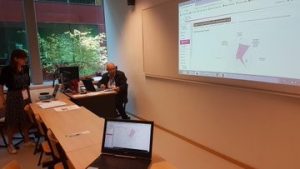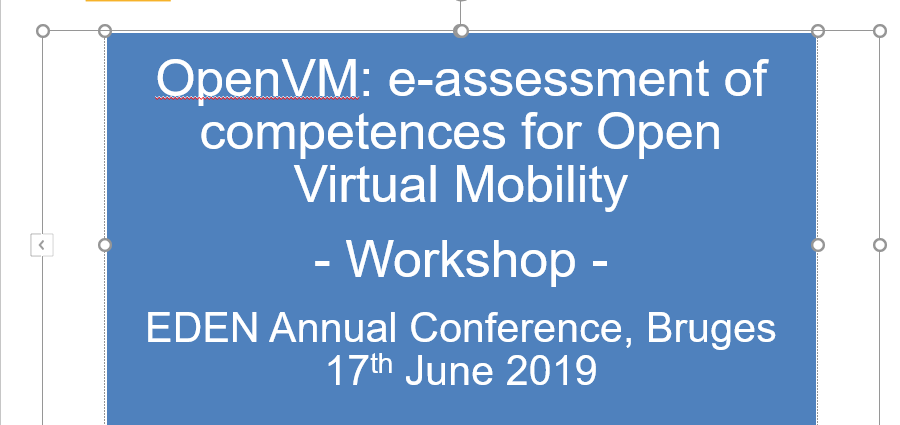EDEN Annual Conference 2019: WORKSHOP
Workshop title
OpenVM: e-assessment of competences for Open Virtual Mobility
duration: 90 minutes
Workshop leader/presenters’ information
Name: Deborah Arnold
Affiliation: AUNEGe
Presenters
Name 1: Gérard Casanova
Affiliation: AUNEGe
Name 3 : Vlad Mihaescu
Politehnica University of Timisoara
Attendance:
12 participants attended the workshop.
There were a mix of teachers, instructional designers, project officers etc. from 9 different countries (see annex 4).
Local participants (Belgium) = 1
International participants: 11 (Canada, Germany, USA, UK (3), Lithuania, Sweden, Spain (2), Switzerland).
It should be noted that the workshop was rescheduled several times by the EDEN programme committee prior to the conference and that some delegates might not have noted the change. Furthermore, the final slot for the workshop was scheduled in parallel to several other sessions, including a major EDEN community event which attracted a significant number of delegates, hence the relatively modest attendance of the workshop.

Brief summary
Higher Education Institutions face high requirements and challenges in today’s global world, including internationalisation as a response to globalisation. Virtual Mobility has great potential to contribute to internationalisation, innovation and inclusion in higher education. While it is feasible to encourage outward and inward student and faculty mobility in HE, the main limitations are the high costs, socio-economic, political and health-related issues. These barriers can be dramatically reduced by adding the virtual component to mobility, thus making mobility accessible to all. The OpenVM Erasmus+ project has defined a framework of Open Virtual Mobility competences for both students and teachers, together with an e-assessment concept and tool for evaluating these competences.
This interactive, hands-on workshop provided participants with insights into the e-assessment concept and the opportunity to evaluate their own Open Virtual Mobility competences using the e-assessment tool. Discussion around potential barriers enriched the debate, and participants were able to identify what their institutions can do to encourage the development of Open Virtual Mobility.
Description of workshop
Objectives of the workshop
The main aim of this workshop was to introduce participants to issues relating to Open Virtual Mobility (VM) in particular to the competences required on the part of both teachers and students in order for VM to become a reality, and to how such competences can be assessed.
A further objective was to provide participants with the opportunity to practice e-assessment of VM competences, through practical, hands-on application.
Justification of the importance/currency/need for the proposed workshop
Higher Education Institutions face high requirements and challenges in today’s global world, including internationalisation as a response to globalisation. Virtual Mobility has great potential to contribute to internationalisation, innovation and inclusion in higher education. While it is feasible to encourage outward and inward student and faculty mobility in HE, the main limitations are the high costs, socio-economic, political and health-related issues. These barriers can be dramatically reduced by adding the virtual component to mobility, thus making mobility accessible to all.
However, Virtual Mobility remains a somewhat vague concept for many, and the notion of Open Virtual Mobility even more so. If VM learners are to get a fully integrated, cultural experience of their online study, then a certain number of conditions need to be met. Specific competences are required on the part of both learners participating in VM, and on the part of teachers and institutions setting up VM programmes and activities. Connecting learners, teachers and institutions through VM is more and more important to combat the threat of fragmentation, nationalism and cultural isolationism to foster the development of truly European and global citizens.
Format of the session
5’ Introductions
10’ Presentation of Open Virtual Mobility: concept and associated competences
15’ Presentation of e-assessment concept for Open Virtual Mobility
40’ Guided hands-on practice using OpenVM e-assessment tool
20’ Feedback and discussion on e-assessment for Open Virtual Mobility competences
Presentation format
The session was divided into four moments: introductions, presentation, hands-on practice and discussion. Priority was given to active participation.
Ways in which the audience was encouraged to participate
The audience participated through real time, hands-on practice of the e-assessment tool and through contributing to the debate. In particular, there was an interesting discussion on what virtual mobility is exactly, and especially the “mobility” element in a virtual course. Deborah Arnold highlighted the emphasis on providing a rich intercultural experience, and that virtual mobility is not just about following an online course from another institution.
The self-assessment tool is implemented in a Moodle course as a plug-in so the participants had to create an account to the course. (See Annex 1 Instructions to create an account and open self-assessment tool.)
References
Open Virtual Mobility: https://www.openvirtualmobility.eu/
Casanova G. (2018). O4-A1.3: e-assessment concept. Erasmus+ Open Virtual Mobility Project. https://www.openvirtualmobility.eu/outputs/1288-o4-a1-3-e-assessment-concept/
Evaluations:
The self-assessment tool:
At the end of the practical part and the use of the virtual mobility skills self-assessment tool, participants completed an online questionnaire to evaluate the tool.
This evaluation questionnaire is an integral part of the continuous improvement of the Open VM project focused on user need to improve the pilots.
The results show that there is room for improvement, especially regarding the usability of the tool.
Conclusion:
Concerning the feedback on the self-assessment tool some improvements will be taken in accounts in the next version of the tool. In particular for the navigation after completing a questionnaire for a skill we could add a button to come back to the main page; on the results page we could explain what to do with the results (choose a sub-mooc); on the instruction page, add some explication elements on the tool’s role and its place in the learning path prior the sub-moocs. To improve the statements, further user testing will be implemented.
Apart from the quality of the presentation, the majority of the answers are satisfied or very satisfied.
After discussion and analysis of the comments, this can be explained by the fact that the presenters went through the presentation part too quickly, in order to give priority to the hand-on practice part. Furthermore, it emerged that the concept of virtual mobility is still very new and requires more attention to defining it, providing concrete examples before discussion. Finally, more clarity needs to be given regarding the link between open virtual mobility and the competency assessment tool and its role in the choice of sub moocs.
Overall, this workshop proved an excellent learning opportunity for both the participants and the presenters, with useful insights gained on both parts.


